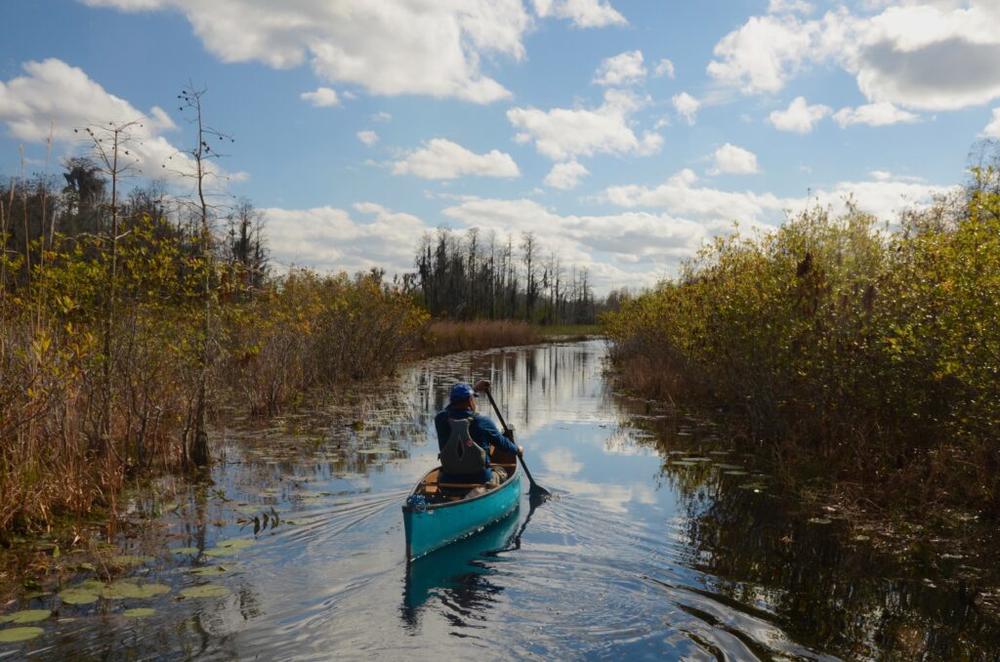
Caption
State regulators heard hours of public comment Tuesday night on an Alabama-based company’s plans to mine near the Okefenokee National Wildlife Refuge.
Credit: Georgia River Network / Joe Cook

State regulators heard hours of public comment Tuesday night on an Alabama-based company’s plans to mine near the Okefenokee National Wildlife Refuge.
State regulators heard from dozens of conservationists and Okefenokee Swamp admirers who urged the state to reverse course on plans to allow an Alabama-based company to mine near the wildlife refuge.
The state Environmental Protection Division issued draft permits for Twin Pines Minerals LLC last month and is in the middle of a 60-day public comment period, which ends April 9. About 90 people spoke at a more than three-hour public hearing held Tuesday evening, with no one speaking in favor of the permits. Nearly 300 people attended the virtual meeting.
Supporters of the project say blocking the mining would infringe on the landowner’s private property rights and they argue the project will bring needed jobs to the rural area. The company plans to mine for titanium dioxide at a demonstration site on Trail Ridge, which is seen as an important barrier for the swamp.
But opponents have blasted the plan as an unnecessary threat to the hydrology of the swamp and its ecosystem, which they argue would also jeopardize the local tourism economy tied to the swamp and open the door to more mining. Twin Pines is seeking permission to withdraw more than 1.4 million gallons daily from the Floridan Aquifer.
Some of Tuesday’s speakers posed technical questions for state regulators to answer, such as what proof has Twin Pines provided to show the mine will not increase the risk of wildfires in the swamp.
Others shared personal, and at times emotional, stories of trips to the swamp and the cherished memories they carry with them. Many of them pleaded for the state to rescind the draft permits and made direct appeals to the decision-makers.
“This might seem like another public hearing that you have to sit through before rubber stamping a permit,” said Will Harlan with the Center for Biological diversity. “But when you all are at the end of your careers, you will look back on this decision … This will be one that defines your career as a public servant. For your sake and the sake of the refuge, I hope you make the right choice.”
Many of the speakers urged the state to protect the refuge, which has been nominated as a UNESCO World Heritage Site, from business interests trying to capitalize on the state’s natural resources. A representative of Twin Pines told lawmakers last year that the minerals found at the site are worth “billions.”
“The idea of mining adjacent to the Okefenokee is nothing but unbridled greed,” Virginia Willis, a chef and James Beard award-winning cookbook author who is a Georgia native, said during Tuesday’s hearing.
“We have one of the most precious places on earth in our state. This place is unique and holy. The mere whisper of a chance that Twin Pines could irreparably harm the swamp is enough,” Willis said.
The permitting process is playing out as the federal government is asserting legal rights to waters that feed the Okefenokee Swamp, the Associated Press reported Monday. The U.S. Fish and Wildlife Service sent a letter to state regulators in late January that cited a federal law that prohibits water from being diverted from the refuge to an extent that could harm its role as a protective habitat.
Michael Lusk, who is the refuge manager for the U.S. Fish and Wildlife Service, asked the state to pause the process so the impact of withdrawing 1.4 million gallons can be studied. Lusk argued that Twin Pines has not provided adequate information to address concerns about the potential harm to the swamp.
“Taxpayers are spending billions of dollars to restore the hydrology of the Everglades system,” Lusk said. “This costly lesson should be applied as we consider actions that can alter the hydrology of the Okefenokee Swamp. We need better information before taking a risk that can impact such an important national treasure.”
Twin Pines’ five-year quest to secure the permits for a 582-acre demonstration mine about three miles from the refuge has long been met with intense public opposition. A recent public comment period on the company’s land use plan attracted 78,632 written comments and 115 oral comments.
“In 1999, I helped gather hundreds of signatures from people who at that time opposed the mining and here I am again. Here we are. What in the world?” Melissa Martin said Tuesday night, referring to the defeated DuPont proposal to mine Trail Ridge.
The issue has loomed especially large this year under the Gold Dome. A south Georgia Republican has pushed without success to pass a ban on future mining at Trail Ridge, which would have thwarted Twin Pines’ expansion plans. A local lawmaker whose district includes the swamp tried to instead advance a three-year moratorium on the kind of mining Twin Pines is proposing, but most advocates panned the proposal as meaningless.
This story comes to GPB through a reporting partnership with Georgia Recorder.